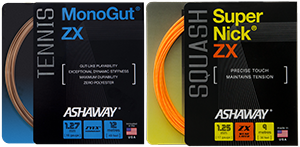|
|
|
Playing Characteristics of PEEK Polymer Strings
|
By Steve Crandall
Vice President, Sales & Marketing
Ashaway Racket Strings

In racquet strings, PEEK offers low dynamic stiffness that allows it to deform and recover more completely than other synthetic materials. It can also be made to have exceptionally low creep under continuous tension, allowing racquet strings to maintain tension and playability longer. |
For the past few years, Ashaway has been marketing several lines of string utilizing the "ZX" designation. As it has always been one of my pet peeves when marketers tout a new technology in ads, but don't really say anything substantive about it, I will try to rectify that here, so far as ZX goes.
For those adept at polymer science PEEK is a high temperature, engineering grade polymer known as polyetheretherketone. According to the online encyclopedia, Wikipedia, "Polyketones are a family of high-performance thermoplastic polymers. The highly polar ketone groups in the polymer backbone of these materials gives rise to a strong attraction between polymer chains, which increases the material's melting point. Such materials also tend to resist solvents and have good mechanical properties."
In layman's terms, this means that PEEK materials have several physical properties of interest to manufacturers. Specifically, PEEK monofilaments and fibers are very tough and durable, and have excellent abrasion resistance, particularly under extreme conditions. The material's melting point is 633ºF (334ºC), which is very high for plastic. Its maximum continuous service temperature is 500ºF (260ºC), and short-term service can be up to 570ºF (300ºC). By contrast, PET, polyester, the material typically used for soda bottles and monofilament tennis string, loses strength rapidly as temperatures reach 200°F. Even much vaunted aramid fibers begin to lose strength around 450°F. So PEEK is hot stuff!
In terms of abrasion resistance, PEEK also offers good performance. In tests measuring "thread on thread" abrasion conducted at room temperature, PEEK multifilaments outlasted aramid fibers by a factor of approximately 5.5. PEEK also has very low moisture uptake at 0.1%, which means you don't need to worry about your racquet string performance in hot and humid conditions. This is why PEEK strings have become so popular in locales closer to the equator.
But perhaps the most interesting application for PEEK-other than racquet strings, of course-is in musical instrument strings. A number of manufacturers now offer PEEK-based violin, guitar, and other musical strings. PEEK monofilament provides a subtle but appreciably fuller tone than other synthetic string materials such as nylon. It also holds tension, so it stays in tune much longer on a guitar or violin than other conventional music strings. So when tennis players say they love the way their PEEK strings sound and how long they play, they have good reason.
In racquet strings, PEEK offers low dynamic stiffness that allows it to deform and recover more completely than other synthetic materials. It can also be made to have exceptionally low creep under continuous tension, allowing racquet strings to maintain tension and playability longer. And as noted previously, the manufacturers continue to improve and "tweak" the material, making it even better for string applications. Recent advances have produced PEEK filaments that are even finer and stronger than before.
Ashaway now markets PEEK-based mono- and multifilament strings for tennis, racquetball and squash. In the tennis world, our flagship string is a PEEK monofilament called MonoGut® ZX that can actually rival natural gut in performance and outlasts it in durability. This string is designed for players seeking both gut-like playability and superior durability in a solid monofilament string, as well as players using monofilament strings in hybrid stringing patterns. Like natural gut, MonoGut ZX retains tension better than any other synthetic material and provides exceptional energy return-meaning power. Also like gut, it remains soft at higher tensions, reducing impact shock. This adds to comfort and what we call 'soft power.' MonoGut ZX contains no polyester, but like its poly cousins, is excellent at generating spin. But more on that in another column.
|